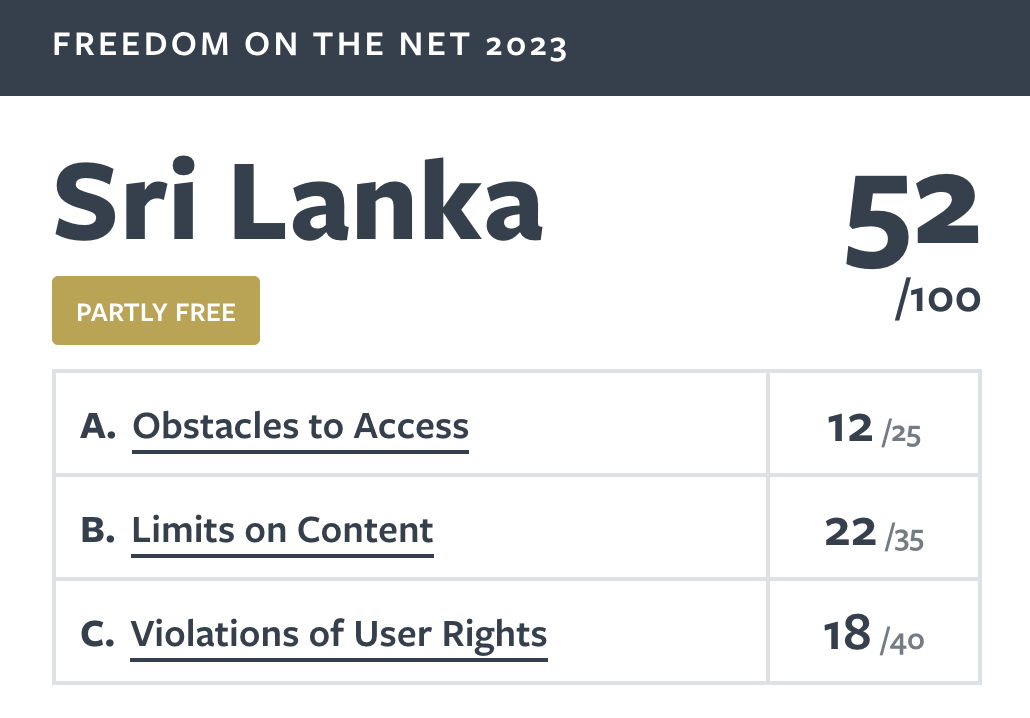
Freedom House has deemed internet freedom in Sri Lanka as only “partly free” in its annual report, highlighting attempts to censor the Tamil Guardian and the detention of Tamils over social media posts.
In their annual report, Freedom House said that the current Sri Lankan government “implemented emergency regulations to bar purportedly false information, continued the brutal crackdown on online activists and journalists reporting on the Aragalaya movement, and introduced draft laws that could encroach on online expression and user privacy”.
The report went on to highlight how “Instagram removed dozens of posts and suspended the Tamil Guardian’s account twice, usually in relation to posts featuring Tamil nationalist protests and notable figures from the Liberation Tigers of Tamil Eelam (LTTE)”.
“Social media platforms, including Facebook, have faced scrutiny for flawed content moderation in Sri Lanka,” Freedom House added. “A January 2022 report by the Intercept, an American news organization, indicated that Facebook has repeatedly failed to distinguish violence-instigating content from journalistic and cultural expression, impacting news publications including the Tamil Guardian.”
In 2021, Instagram removed dozens of posts and suspended the Tamil Guardian’s account twice.
Read more:
STATEMENT - Instagram disables Tamil Guardian’s page in act of online censorship
STATEMENT - Tamil Guardian Instagram reinstated but questions remain unanswered
STATEMENT - Tamil Guardian Instagram disabled once more
Canadian politicians denounce Instagram’s ban of Tamil Guardian
Reporters Without Borders calls for Tamil Guardian’s Instagram to be reinstated
‘Facebook’s Tamil censorship highlights risk to everyone’ – The Intercept
In December 2020, Twitter notified the editors of the Tamil Guardian that Sri Lanka’s Criminal Investigations Department had formally written to the social media platform, calling for posts by the news website to be removed.
How Sri Lanka’s CID tried to take down Tamil Guardian’s Twitter
“The CID and TID reportedly monitor the online space,” continued Freedom House. “During the previous coverage period, while discussing the arrests of Tamil youth for posts that allegedly referenced or promoted the LTTE, a government official said that the CID and TID deploy teams that monitor the internet and social media platforms.”
From 2018 to 2021 up to 60 Tamil youth were arrested predominantly under the ICCPR Act and under the Prevention of Terrorism Act as well. In July 2021, a man was arrested for posting a photograph of Liberation of Tamil Eelam leader Velupillai Prabhakaran, three years previously in 2018. In March 2021 the TID also arrested and confiscated all the equipment of two people for supposedly promoting LTTE propaganda.
Journalists too have come under the scrutiny of the government and have been assaulted, intimidated, and harassed. The report highlighted the experience of Sasikaran Punniyamoorthy, a freelance journalist and activist, whose photos of his family were circulated on Facebook, resulting in harassment in May 2022. “In September 2022, Selvakumar Nilanthan, a reporter for Tamil Guardian and frequent target of intimidation attempts, was summoned for questioning about alleged links to the LTTE,” noted Freedom House.
The full internet freedom report can be read here.
